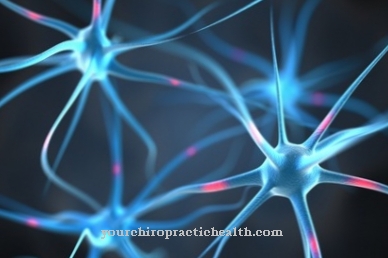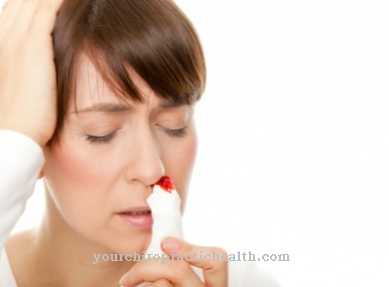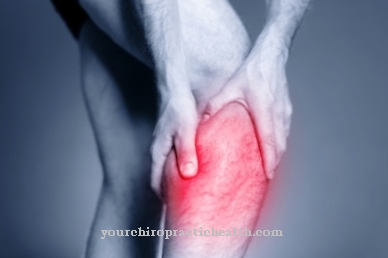As Panic attacks, Panic attacks, Anxiety attacks or Panic disorder are often common Anxiety attacks which mostly occur suddenly and for no apparent reason. The panic attacks are often accompanied by other symptoms, which often give the person affected the feeling of being in a life-threatening situation.
What are Panic Attacks?

In contrast to normal fear, panic attacks are often repetitive attacks of fear or panic. Usually, fear is a vital and natural basic feeling that alerts the brain and body to danger. All reflexes, forces and concentrations for a potential flight or a fight are mobilized very quickly. However, if this fear occurs more and more frequently, it is called a panic attack.
Panic attacks almost always occur spontaneously and out of the blue and can last up to 30 minutes.
Typical accompanying symptoms of a panic attack are mostly dizziness, fear, anxiety, shortness of breath or hyperventilation, paleness, palpitations, inner restlessness, sweating and tremors. These symptoms often make people think that they are about to have a heart attack, stroke, or circulatory shock, or are about to die.
Statistically speaking, panic attacks mostly occur in women under the age of 30. Unfortunately, many doctors often do not diagnose panic attacks in those affected, but concentrate more on the accompanying symptoms in order to find a physical cause. In this case, tablets and medication are often prescribed that do not reduce the panic attacks in any way. It is not uncommon for those affected to be treated by several doctors for years without the right cause of their panic attacks being found. Of course, this in turn increases the uncertainty and thus stirs up further anxiety attacks.
causes
Panic attacks can occur, for example, out of fear of poisonous animals (e.g. arachnophobia) or out of fear of dangerous situations (e.g. fear of heights, claustrophobia). Often, however, those affected do not even know why they suffer from panic attacks, even in harmless situations. This in turn can lead to a fear of possible worse causes or diseases. If the panic attacks accumulate, the patients can also be afraid of the fear and one speaks of an anxiety phobia (or anxiety disorder).
Most panic attacks are caused by too much stress, social and professional problems (e.g. excessive demands, bullying, death of a loved one), too little sleep, too much alcohol and nicotine and too little relaxation, physical activity (sport) and a natural balance in the Nature.
You can find your medication here
➔ Medicines for panic attacks and anxiety
Diseases with this symptom
- Fear of heights
- Exam anxiety
- Post-traumatic stress disorder
- claustrophobia
- Dental phobia
- epilepsy
- Anxiety disorder
- fear of flying
- Hypoglycaemia
Complications
If panic attacks are left untreated, they often become chronic. The anxiety states then occur at ever shorter intervals, the anxiety-free intervals increasingly decrease. In the constant expectation of a new panic attack, all situations that could trigger an attack are avoided: In particular, the fear of open spaces (agoraphobia) and crowds occurs very often after repeated panic attacks.
As a far-reaching complication, the pronounced avoidance behavior often leads to social withdrawal and even loss of ability to work. As a result, depression can develop, which in the worst case scenario leads to suicide. Even after successful therapy, there is a higher risk of developing other mental disorders later in life after the occurrence of panic attacks.
Trying to fight anxiety attacks with alcohol often results in addiction. Even antidepressants prescribed by a doctor are not without risk: If you stop abruptly after taking them regularly, there is a risk of health problems such as dizziness, nausea and a recurrence of panic attacks. Medical treatment with sedatives can also result in addiction, and the subsequent withdrawal therapy often triggers new panic attacks.
When should you go to the doctor?
Even with the first panic attack, many people go to the doctor because they fear a heart attack or stroke due to the strong symptoms such as palpitations, dizziness and sweating. Concerning the physique, this visit to the doctor would be unnecessary. However, it can have a calming effect on those affected if they know the cause of their symptoms and try to understand the nature of panic attacks. Often this reassurance is sufficient and the patients use their knowledge for the connection between stressful and stressful situations and fear in order to avoid further panic attacks from the outset.
Another visit to the family doctor, which may lead to a referral to a psychologist or psychotherapist, is necessary if the panic attacks occur more frequently. You could then significantly limit the life of the person affected, so that psychological support is required. The danger of leaving panic attacks untreated lies in two complications. On the one hand, the patient can adopt avoidance behavior in relation to all situations (subway, restaurant, plane) in which such attacks have already occurred. On the other hand, the so-called fear of expectation threatens.
This means that the panic has so firmly settled in the mind of the person concerned that he is anxiously waiting for the next attack and thus provokes it. Then, at the latest, further medical support is necessary so that this cycle can be broken, for example with targeted behavioral therapy.
Doctors & therapists in your area
Treatment & Therapy
In principle, panic attacks are always curable. Only the triggering causes have to be found. However, this is often quite difficult and tedious and requires a lot of inner strength and motivation from the person concerned.
First of all, the person affected should find a good doctor who does not declare him crazy (because he is not at all) and who takes his panic attacks seriously and diagnoses them as such. As a rule, he will then refer you to a specialist (e.g. psychologist) or a trained psychotherapist. Together with this specialist, life is then carefully examined to find possible causes for the panic attacks.
In terms of therapy, autogenic training and progressive muscle relaxation have proven particularly useful as support. They ensure inner balance and give strength to cope with problems in everyday life and at work. For a cure from panic attacks, however, it is crucial that you find the causes in your life and eliminate them, even if this should mean a complete change in your previous lifestyle.
Psychiatric drugs should only be prescribed by a doctor in very severe cases. Herbal products made from valerian and lemon balm are cheaper for body and soul.
Outlook & forecast
Panic attacks occur in many people and lead to a greatly reduced quality of life. Simple everyday processes can no longer be carried out in the usual way. It is hardly possible to survive everyday work with panic attacks, and attending school is relatively difficult. If these are triggered by stress or a special situation and do not occur permanently, the panic attacks do not necessarily have to be treated by a doctor. Here the patient can often bring the panic attacks under control himself.
However, if the panic attacks occur frequently and lead to very bad feelings, therapy is definitely necessary. Panic attacks often lead to rapid heartbeat, shortness of breath, dizziness and profuse sweating. In many cases, the panic attacks also lead to a heart attack. Many people also faint from severe panic attacks.
Treatment is carried out with medication and therapy. The medication has a calming effect and is intended to prevent panic attacks from occurring. Talking to a psychologist will also help reduce panic attacks by addressing their causes. Therapy is often successful, but it can take several months before it works and the panic attacks subside.
You can find your medication here
➔ Medicines for panic attacks and anxiety
Home remedies & herbs for panic attacks
- Valerian, taken as drops, calms the heart and nerves and also helps with stroke.
prevention
Above all, avoid stress, too much alcohol and nicotine. Exercise a lot in nature and do sport regularly. If possible, solve social and professional problems quickly. Autogenic training and progressive muscle relaxation also have a preventive effect, strengthening you mentally against the pitfalls of everyday life and thus preventing panic attacks.
You can do that yourself
In the event of panic attacks, the patient should definitely go to safety and sit or lie down. Taking a deep breath and drinking plenty of fluids will also help with a panic attack. Ideally, friends, family or colleagues should be notified and be with the person concerned so that the panic can go away.
Anyone suffering from panic attacks should not wear clothes that are too warm. Airy clothes and especially those that are easy to take off are ideal. Valerian helps against panic attacks and for general calming. This can be taken in the form of tablets or tea before going to sleep or during the day. In the pharmacy there are also other herbal remedies that are used to calm the body. Avoid unnecessary stress in any case. The patient should not engage in heated discussions or arguments in order to prevent the panic attacks.
Before going to sleep, it is worth doing some relaxation exercises, such as yoga. Ordinary conversations with friends or with a partner often help against panic. However, the person concerned has to admit to himself that he is suffering from the symptom. If self-help does not lead to success, a psychologist must be consulted in any case.



























